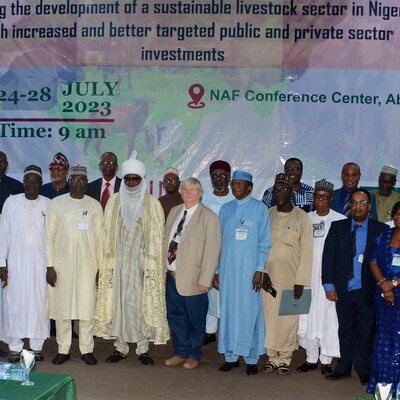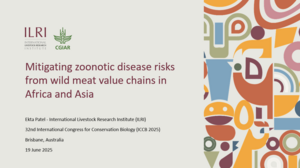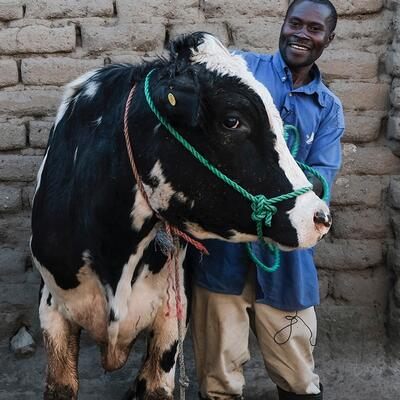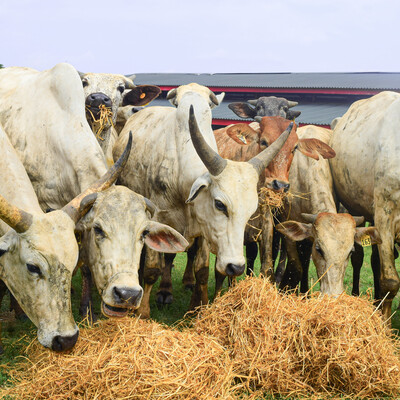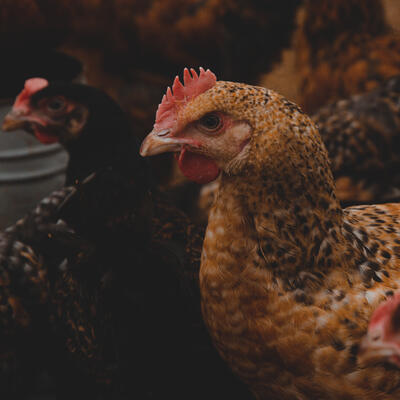

Nigeria
What ILRI does
ILRI’s mission is to improve food and nutritional security and to reduce poverty in developing countries through research for efficient, safe, and sustainable use of livestock — ensuring better lives through livestock. The institute’s research for development agenda addresses the complex mix of challenges and opportunities faced by small- and medium-scale livestock operators who are currently providing most of the meat, milk, eggs as well as staple cereals across the diverse mixed and pastoral husbandry systems of Africa and Asia. Such enterprises present multiple and synergistic opportunities to meet the rising demand for milk, meat and eggs; while simultaneously improving incomes, livelihoods and nutrition for poor households, strengthening adaptive capacity and resilience (especially to climate change) and alleviating the threats posted by livestock farming to human and environmental health.
The livestock challenge in Nigeria
Nigeria’s livestock sector plays a vital role in the economy, contributing about 17% of the agricultural GDP and 5% to the national GDP. However, it faces challenges that impact productivity, sustainability, and food security. Inadequate feed resources contribute to farmer-herder conflicts, while low local breed productivity and diseases hamper growth. Lack of data and inefficiencies are further hurdles. Downstream, insufficient support and extension services limit the adoption of modern techniques by livestock farmers. Coordination within livestock value chains is lacking. Addressing these issues requires better resource utilization, funding access, marketing and favorable policies. Research for alternative feed resources and indigenous breed improvement is crucial to boost productivity amid growing demand for livestock products.
The International Livestock Research Institute (ILRI) has the capacity to play a significant role in supporting Nigeria’s livestock sector through research, technical assistance and evidence-based policy frameworks. By closing production gaps and fostering sustainable growth, ILRI and its partners are helping to build resilience in Nigeria’s livestock sector and unlock its potential for a prosperous future.
‘As an experienced poultry farmer who has tested and adopted the use of HQCP, I am encouraging ILRI to push and get more people to be trained and certified on the processing. I am ready to be an ambassador and tell all poultry farmers that HQCP is a good alternative to Maize and can help reduce the price of poultry products.’
Engineer John Olateru
Poultry farmer

ILRI/Folusho Onifade
Interns at ILRI practicing the forage transplanting process
‘When the Oyo State Governor and our agency, OYSADA, decided to employ and equip over 1000 youths with the necessary skills needed to thrive in any agricultural enterprise of their choosing, we saw ILRI Nigeria as the perfect institute to train youths about the livestock production opportunities that exist around them.’
Dr Debo Akande
Executive Adviser on Agribusinesses to Oyo state Governor and Director-General
Oyo State Agribusiness Development Agency
How is ILRI addressing these challenges
In strong partnership with government agencies, the private sector and all stakeholders, ILRI has been a driving force in livestock research and development in Nigeria for over four decades. Throughout this time, ILRI has undertaken projects that remain priority areas for ongoing research and development in the country.
- Feed Resource Development: ILRI’s focus on researching feed and forage improvement methods has led to advancements in climate-smart forage species and conservation. Ongoing research involves the evaluation of new forage species in various agroecological zones and exploring the potential of food-feed crops. ILRI also conducts research on the use of High Quality Cassava Peel (HQCP) as a partial replacement for maize in animal diets, particularly in poultry farming.
- Livestock Genetics and Conservation: Through collaboration with partners, ILRI is working to enhance local livestock breeds using advanced breeding and genetic conservation techniques, while contributing to the preservation of valuable indigenous livestock diversity.
- Capacity building in non-conventional feed resources: ILRI plays a pivotal role in educating stakeholders on the use of alternative feed resources in livestock feeds, notably the High Quality Cassava Peel (HQCP), a novel feed supplement derived from cassava peels that is nutritious, sustainable and cost-effective. ILRI conducts training sessions on small ruminant, poultry and cattle production to equip stakeholders with knowledge about available value chains and best practices. ILRI is also strengthening the feed landscape capacity using Near-Infrared Spectroscopy (NIRS) technology for rapid and accurate analysis of feed.
- Policy and Advocacy: ILRI actively supports policymakers by providing technical assistance and sharing scientific evidence and recommendations for livestock-related policies, including the National Feed Policy and Livestock Master Plan. ILRI’s contributions extend beyond government collaborations, offering technical backstopping and evidence-based knowledge to numerous private and multinational organizations. Through these efforts, ILRI is fostering the development and dissemination of appropriate technologies and practices that enhance
Current ILRI activities in Nigeria
ILRI’s ongoing initiatives encompass a diverse range of projects aimed at fostering sustainable and resilient livestock development in Nigeria.
- High-Quality Cassava Peel (HQCP) production scaling, providing training and support to over 1,100 individuals individuals who are either starting up or intending to scale up the HQCP technology. Efforts to scale HQCP production is increasing the demand from poultry and ruminant farmers for this innovative feed resource.
- Capacity development through specialized training in different livestock production and value chains, which are benefiting over 3,300 youths in goat production and 100 entrepreneurs in poultry production.
- Promoting fodder potential from staple food crops such as maize and rice with partners Africa Rice and IITA. Successful efforts could lead to the availability of approximately 26.5 million tonnes of rice straw and 18.4 million tonnes of maize stover annually for livestock feed.
- Evaluating and identifying suitable forage species such as grasses and legumes for areas with limited resources, reducing the environmental impact of livestock production and ensuring sustainable practices.
- Assessing fodder market potential in Nigerian livestock markets, enhancing market access and efficiency for livestock farmers.
- Supporting genetic conservation and improvement of indigenous livestock breeds like the West African Dwarf Goat and Muturu cattle, safeguarding valuable genetic diversity.
- Assisting the USAID Feed the Future’s GAIN initiative, addressing food safety and foodborne disease issues in Nigeria’s livestock sector.
- Analyzing demand and consumption trends of animal products in Nigeria, providing critical insights for strategic planning.
- Facilitating the development of sustainable National Livestock transformation plans at state and national levels (Livestock Productivity and Resilience Support - LPRES), ensuring holistic livestock sector growth.
- Developing tropically adapted local chicken breeds through the African Chicken Genetics Gains (ACGG) project, contributing to the genetic improvement of smallholder poultry production. Further investment is looking into antimicrobial usage in smallholder poultry production in Nigeria
ILRI STAFF
Partners
You may also like
Related Publications

Structure, conservation and health implications of urban wild meat value chains: A case study of Lagos, Nigeria
- Akpan, S.N.
- Hooft, P. van
- Happi, A.N.
- Buij, R.
- Langevelde, F. van
- Cook, Elizabeth A.J.
- Hassell, J.M.
- Zimmerman, D.M.
- Masudi, Sherril P.
- Happi, C.T.
- Thomas, Lian F.
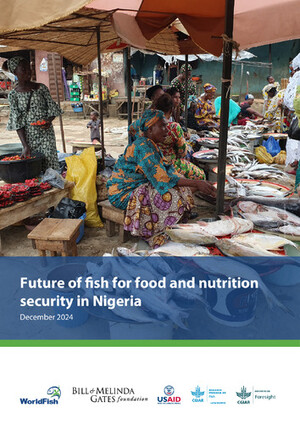
Future of fish for food and nutrition security in Nigeria
- Chan, Chin Yee
- Long Chu, Hoang
- Tran, Nhuong
- Sari, Evren Can
- Cheong, Kai Ching
- Olagunju, Olanrewaju
- Shikuku, Kelvin
- Byrd, Kendra
- Diyzee, Kanar
- Subasinghe, Rohana
- Siriwardena, Sunil
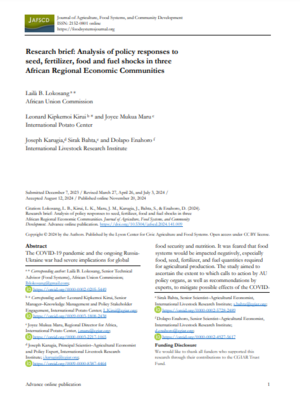
Research brief: Analysis of policy responses to seed, fertilizer, food and fuel shocks in three African Regional Economic Communities
- Lokosang, L.B.
- Kirui, L.K.
- Maru, J.
- Karugia, Joseph T.
- Bahta, Sirak T.
- Enahoro, Dolapo K.

Impact of gender-norms on women’s economic resilience to climate change
- Mudege, Netsayi Noris
- Cole, Steven
- Adeyeye, Olajumoke
- Bullock, Renee
- Achandi, Esther
- Galiè, Alessandra
- Muzungaire, Lizzy
- Kakwasha, Keagan














